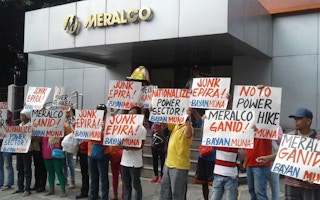The Asian Development Bank, currently one of Asia’s biggest sources of development financing, has signalled that private capital mobilisation will be a huge part of its strategy to hit pressing climate goals, given difficult budgetary conditions that have rendered traditional lending models inadequate.
At its 56th annual general meeting held in Incheon, South Korea, earlier this month, the multilateral lender launched a new climate financing facility, through which it plans to extend loans of up to US$15 billion for incentivising climate action in Asia Pacific.
It also reiterated its commitment to catalyse funding for private sector-led development and scale up non-sovereign borrowing to one-third by number of bank operations by next year, a significant increase from 27 per cent share in 2021. This is as ADB president Masatsugu Asakawa emphasised the importance of “leveraging the enormous potential of the private sector”.
Regional rights advocacy groups, however, are cautioning against the ADB leaning too much on the private sector, worried that this would mean projects falling short of meeting due diligence and transparency standards, or that conditions set by private sector players would impact local communities, given the ADB’s less-than-ideal track record.
Rene Ofreneo, president of Freedom from Debt Coalition, a non-government organisation that advocates on debt issues related to multilateral development banks and international financial institutions, cited ADB’s backing of the passage of the landmark pro-market Electric Power Industry Reform Act (EPIRA) in the Philippines in 2001, which critics now believe was what led to consumers seeing an escalation in their monthly electricity bills, as an example of the negative consequences that can come about if social and economic rights are not adequately considered.
Due to its perceived ineffectiveness, some have called for a review, if not an outright repeal of EPIRA. The NGO Forum on ADB, a network of civil society organisations, in a publication last year, pointed to how ADB, along with World Bank and Japan Bank for International Cooperation (JBIC), which were the largest lenders to the Philippines’ National Power Corporation (Napocor) had required for EPIRA to be passed as a condition for the state-owned electricity provider to access additional loans.
“According to its proponents, EPIRA was supposed to be the answer to power and fiscal woes of the Philippines. But years later, the country now has the most expensive electricity in Asia. Price manipulation besets the industry. Price manipulation besets the industry…And Napocor remains neck-deep in debt,” it said.
Ofreneo, a former dean of the school of labour and industrial relations at the University of the Philippines, tells Eco-Business that he broadly supports the mobilisation of private capital, but reminds that the ADB needs to tread carefully, and avoid creating spillover effects on local communities while expanding private sector financing.
Referring to the EPIRA woes, he said: “Promises of cheaper power, universal coverage and efficiency in service delivery were all broken. The policy even allowed cherry-picking and monopolisation by the big corporations.”
Annabel Perreras, project data analyst of NGO Forum on ADB, said while the multilateral has made progress towards reform, consultations on its strategy for ramped up private funding suggest that the lender may prioritise the private sector and borrowing governments over the well-being of affected communities and the environment.
Perreras said that there is the fear that the increase of private sector financing will come at the expense of due diligence and transparency standards. “This poses the risk that communities affected by private sector financing might not have access to participate in meaningful consultation or voice their dissent in ADB-backed projects.”
NGO Forum on ADB raised the example of how an ADB-backed project to build a hydroelectric dam in Laos in 2005 – then Southeast Asia’s first major multilaterally-funded public-private partnership – had not delivered on its commitments to improve the livelihoods of local communities. Reports highlight a lack of sustainable employment and the poor quality of land allotments for families displaced by the project; villagers who were supposed to received compensation for lost paddy fields and gardens were not consulted sufficiently on the final compensation sums, said the watchdog.
In response to Eco-Business’s queries, ADB said it will not comment further as the examples brought up to highlight the issues with private sector financing by the rights advocacy groups are over two decades old.
In 2022, the ADB extended US$3 billion in financial assistance to the Philippines, the fifth highest loan amount in the region. This year, it is earmarking US$4 billion worth of loan financing to support development projects.
The ADB has said that developing Asia needs to invest US$13.8 trillion in infrastructure from 2023 to 2030 to support growth and meet climate goals. In its latest strategy document, it says that it aims to reach $100 billion of climate financing from its own account by 2030 and has committed to having 100 per cent of its sovereign operations and 85 per cent of its private sector operations aligned with the Paris Agreement by 1 July 2023.
Want more Philippines ESG and sustainability news and views? Subscribe to our Eco-Business Philippines newsletter here.

















